- Back to Home »
- 'Gravel came flying up in our faces'
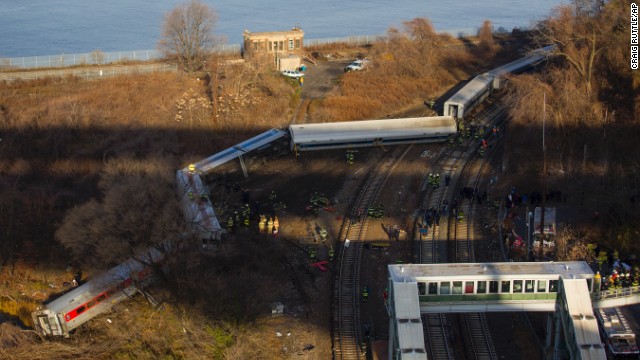 First responders gather around the derailment of a Metro-North passenger train in the Bronx borough of New York on Sunday, December 1. Of eight train cars, seven were off the tracks.
First responders gather around the derailment of a Metro-North passenger train in the Bronx borough of New York on Sunday, December 1. Of eight train cars, seven were off the tracks. 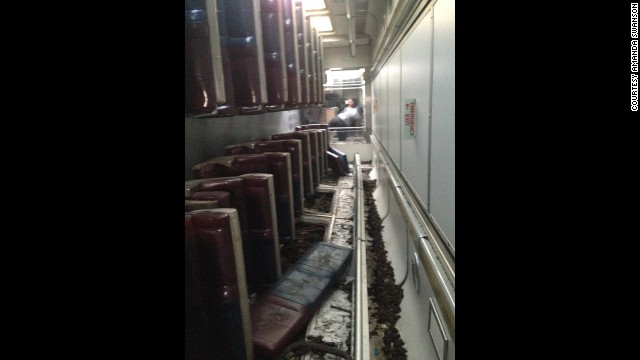 "The windows broke out. ... The gravel came flying up in our faces," said passenger Amanda Swanson, who put her bag in front of her face to block the rubble. "I really didn't know if I would survive," she said. "The train felt like it was on its side and dragging for a long time. ... The whole thing felt like slow motion."
"The windows broke out. ... The gravel came flying up in our faces," said passenger Amanda Swanson, who put her bag in front of her face to block the rubble. "I really didn't know if I would survive," she said. "The train felt like it was on its side and dragging for a long time. ... The whole thing felt like slow motion." 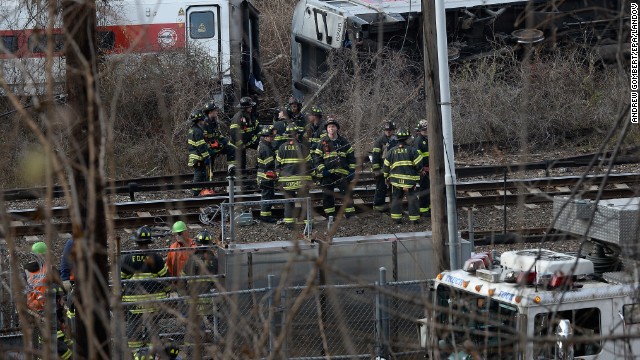 Firefighters and rescue personnel work at the scene of the passenger train derailment near the Spuyten Duyvil station.
Firefighters and rescue personnel work at the scene of the passenger train derailment near the Spuyten Duyvil station. 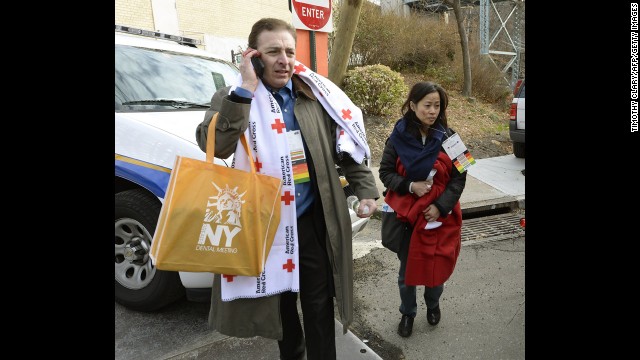 Passengers who were on the derailed train walk away from the scene.
Passengers who were on the derailed train walk away from the scene. 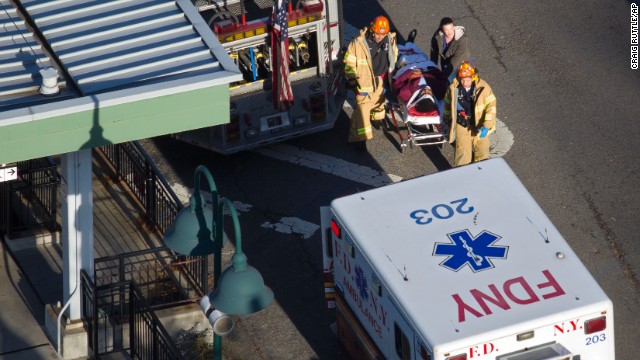 A person is evacuated from the scene of the derailment.
A person is evacuated from the scene of the derailment. 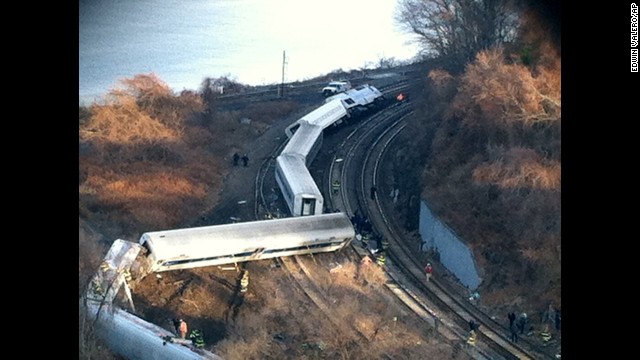 Cars from the Metro-North passenger train are scattered across the tracks.
Cars from the Metro-North passenger train are scattered across the tracks. 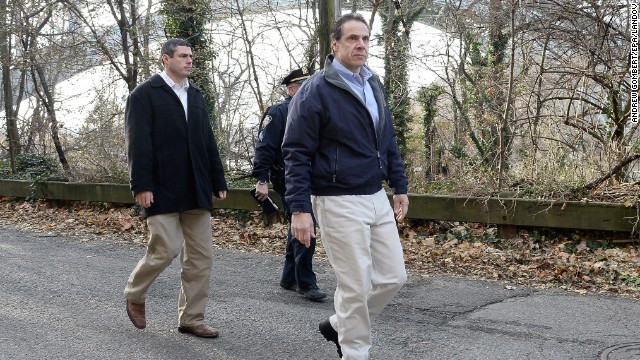 New York Gov. Andrew Cuomo, right, arrives on the scene of the fatal passenger train derailment. "In terms of causes, we don't know exactly what happened," Cuomo said.
New York Gov. Andrew Cuomo, right, arrives on the scene of the fatal passenger train derailment. "In terms of causes, we don't know exactly what happened," Cuomo said. 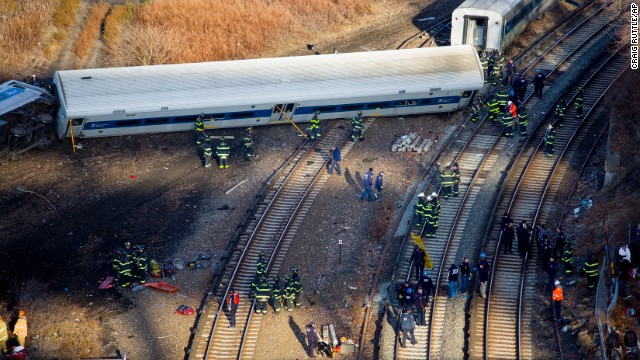 Firefighters and emergency rescuers swarm the scene near Spuyten Duyvil station in the Bronx, where train cars had flipped on their sides. One car was just feet away from the Harlem River.
Firefighters and emergency rescuers swarm the scene near Spuyten Duyvil station in the Bronx, where train cars had flipped on their sides. One car was just feet away from the Harlem River. 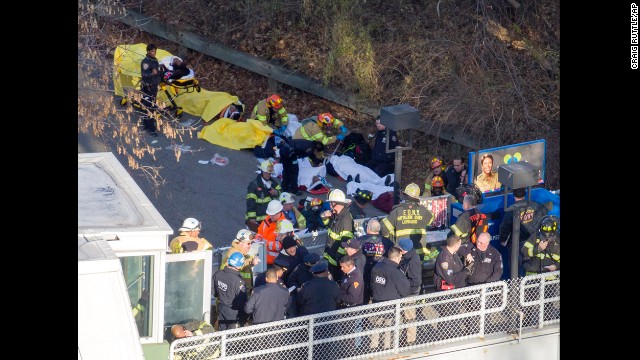 Injured people are tended to by first responders near the site of the derailment.
Injured people are tended to by first responders near the site of the derailment. 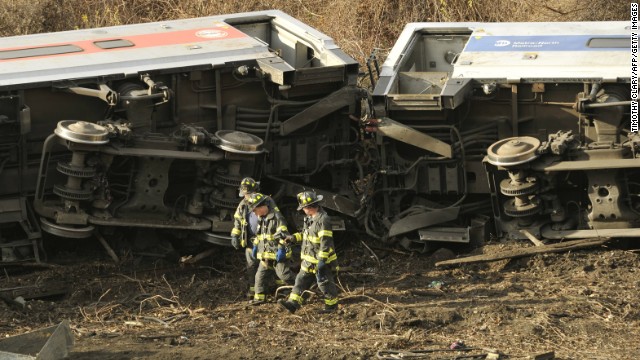 The train operator -- who is among the injured -- told investigators he applied brakes to the train, but it didn't slow down, a law enforcement official on the scene and familiar with the investigation said.
The train operator -- who is among the injured -- told investigators he applied brakes to the train, but it didn't slow down, a law enforcement official on the scene and familiar with the investigation said. 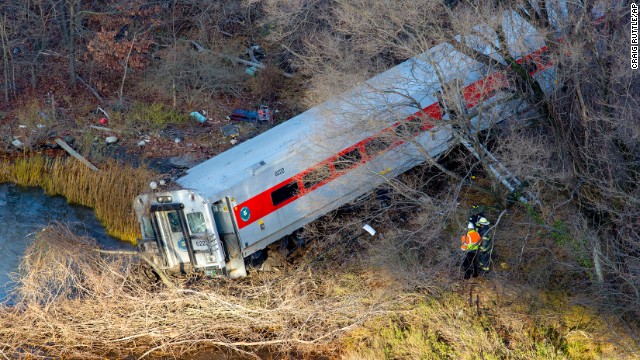 Police divers were in the Harlem River hours after the crash searching for survivors, CNN affiliate WABC reported.
Police divers were in the Harlem River hours after the crash searching for survivors, CNN affiliate WABC reported. 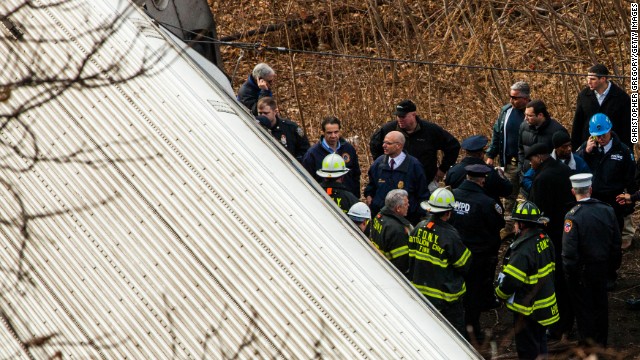 Cuomo inspects the damage along with emergency crews.
Cuomo inspects the damage along with emergency crews. 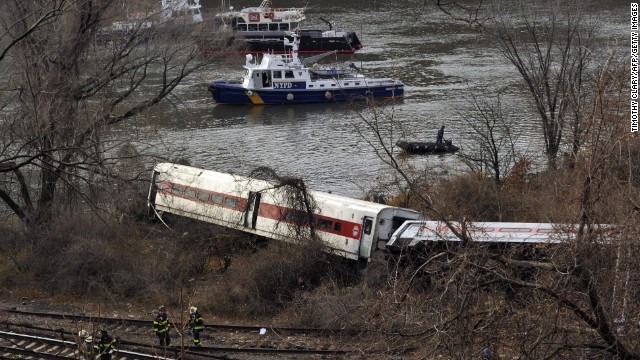 Emergency crews work at the scene of the train wreck.
Emergency crews work at the scene of the train wreck. 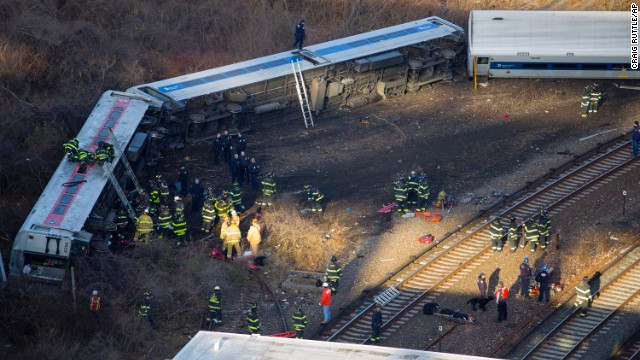 First responders gather at the scene of the derailment. The train came off the tracks just as it was coming around a sharp curve.
First responders gather at the scene of the derailment. The train came off the tracks just as it was coming around a sharp curve. 
1

2

3

4

5

6

7

8

9

10

11

12

13

14
- 4 people are dead and 11 critically injured after a passenger train derails in the Bronx
- "The train felt like it was on its side and dragging for a long time," one passenger says
- Service has been suspended on part of the Hudson Line in New York
- A freight train derailed in the same area in July
(CNN) -- Even though the train was careening around a curve, Amanda Swanson felt the wreck in slow motion.
All seven passenger cars jumped the tracks. The windows of the coaches broke out. Then "gravel came flying up in our faces," Swanson said.
"I really didn't know if I would survive. The train felt like it was on its side and dragging for a long time," said Swanson, who put her bag in front of her face to block the rubble.
"I just closed my eyes and kind of hoped to God that I was going to be able to call my mom with decent news."
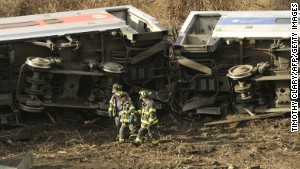 7 train cars derailed at Bronx station
7 train cars derailed at Bronx station 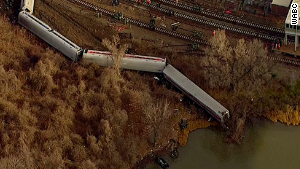 Train spokesman: No passengers in river
Train spokesman: No passengers in river 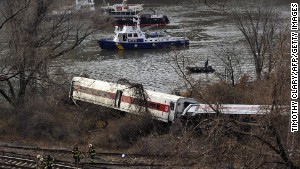 Passenger: Train was going too fast
Passenger: Train was going too fast 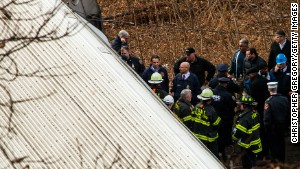 Eyewitness: 'Very disturbing, very loud'
Eyewitness: 'Very disturbing, very loud' Eventually, the car she was in came to a stop with a thud. She managed to get off the train carrying her cell phone, its screen shattered but still working.
But four others died and at least 67 were injured after the train derailed in the Bronx, about 10 miles north of Manhattan's Grand Central Terminal on Sunday morning.
Three of the dead were thrown out of the train as it "came off the track and was twisting and turning," New York Fire Department Chief Edward Kilduff told reporters.
One car came to rest just feet away from the Harlem River.
Early Monday morning, workers began uprighting the cars to the extent that safety officials would allow, a spokesman for Metro North Railroad said.
"The first to be re-railed will be the locomotive, which is expected shortly," said Aaron Donovan said.
A dangerous turn
It's not the first time a train jumped the tracks on that turn. A freight train derailed in the same curve in July, damaging about 1,500 feet of track, Metropolitan Transit Authority reported at the time.
"That is a dangerous area on the track just by design," New York Gov. Andrew Cuomo said after Sunday's crash. "The trains are going about 70 miles an hour coming down the straight part of the track. They slow to about 30 miles per hour to make that sharp curve ... where the Hudson River meets the Harlem River, and that is a difficult area of the track."
Weener said the NTSB would look into whether there was any connection between that derailment and Sunday's crash, but both he and Cuomo discounted the possibility.
"The curve has been here for many, many years, right, and trains take the curve every day, 365 days a year ... We've always had this configuration. We didn't have accidents," Cuomo said. "So there has to be another factor, and that's what we want to learn from the NTSB."
The train operator -- who is among the injured -- told investigators he applied brakes to the train, but it didn't slow down, said a law enforcement official who was on the scene and is familiar with the investigation.
"That will be a key point of concern, whether this train was moving too quickly," said Joe Bruno, New York's commissioner of emergency management.
Investigators have recovered an event recorder from the locomotive and another car, but haven't yet examined them, Earl Weener of the National Transportation Safety Board said.
The victims
The MTA identified those killed as Donna L. Smith, 54, of Newburgh, New York; James G. Lovell, 58, of Cold Spring, New York; James M. Ferrari, 59, of Montrose, New York; and Ahn Kisook, 35, of Queens, New York.
Lovell did freelance audio and was headed into New York to work Sunday morning, said Dave Merandy, a town council member in the Hudson Valley community of Philipstown.
"He loved his family and did what was necessary to keep things afloat with his family. He was a great man," Merandy said.
At least 67 people were injured, Bruno said. One suffered a spinal cord injury that could leave him paralyzed from the neck down, said Dr. David Listman, director of the emergency department at St. Barnabas Hospital in the Bronx.
Commuting delays
The Metro-North Hudson Line had a ridership of 15.9 million last year, with hundreds of people riding the packed trains during weekday rush hour, officials said.
The governor advised Monday morning commuters in the area to plan for a long commute or use the Harlem Line, which runs roughly parallel to the damaged Hudson Line.
Service was suspended Sunday on part of the Hudson Line and won't resume until the NTSB finishes documenting the scene and returns the track to the MTA for repairs, Cuomo said.
Though no connection has been established between the derailments Sunday and in July, one state lawmaker said the crashes are a sign that federal investigators should examine track conditions throughout the region.
"It is important that the entire regional track infrastructure be examined to identify any chronic issues that have led to past derailments or could lead to future derailments in order to ensure the safety of the millions of people who use the trains every single day," New York State Sen. Charles J. Fuschillo Jr. said in a statement.
CNN's Eden Pontz reported from New York. CNN's Holly Yan and AnneClaire Stapleton reported from Atlanta. CNN's Lorenzo Ferrigno, Alexandra Field, Catherine E. Shoichet, Kristina Sgueglia, Jon Auerbach, Dana Garrett, Shimon Prokupecz, Joe Johns and Mike M. Ahlers contributed to this report.







